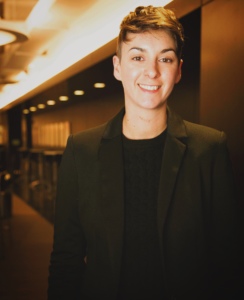News
Meet the Fellows: 2020 Women’s Studies Fellow Emma Mishel
Emma Mishel • New York University, sociology
Determinants of Labor Market Discrimination against Sexual Minorities in the US: An Intersectional and Experimental Analysis of Common Stereotypes
 Each year, Citizens & Scholars invites new Fellows to submit a brief story introducing themselves and/or their work. Emma Mishel, a 2020 Women’s Studies Fellow, is a doctoral candidate in sociology at New York University whose dissertation explores the determinants of labor market discrimination against sexual minorities in the US.
Each year, Citizens & Scholars invites new Fellows to submit a brief story introducing themselves and/or their work. Emma Mishel, a 2020 Women’s Studies Fellow, is a doctoral candidate in sociology at New York University whose dissertation explores the determinants of labor market discrimination against sexual minorities in the US.
I must have hit “send” over 50 times. I was applying to open positions in New York, where I had recently relocated. Despite meeting the job qualifications, I hadn’t heard back from a majority of the companies where I sent my résumé. I couldn’t understand why, and then it dawned on me; having worked at several lesbian, gay, bisexual and transgender (LGBT) non-profit organizations throughout my career, was my résumé “too gay” for these hiring managers? Was I being perceived as a lesbian, and was that affecting my chances of being hired?
When I began my graduate studies at New York University a few years later, I kept thinking back to those questions, and they ultimately inspired my dissertation research. Using three different experimental methods, my dissertation seeks to answer: Are people who are perceived to be gay or lesbian discriminated against in the United States labor market? Does the effect of gay/lesbian identity differ by race? Do local non-discrimination laws or personality traits sought after in the job advertisement play a role in discrimination? What are some mechanisms behind discrimination? And lastly, are there contexts in which gay or lesbian employees are advantaged in the labor market?
My dissertation advances research that posits that employment discrimination may not necessarily be standard across all occupations or subgroups of gay employees, but rather, is shaped by important demographic and contextual factors, intersecting identities, and/or common stereotypes that people hold about certain groups. It also has important policy implications, as it identifies real-world estimates of when and how occupational discrimination occurs for sexual minorities. This is important, because today in the United States, it is still legal in 29 states to differentially compensate, not hire, not promote, or fire someone because they are lesbian, gay, or bisexual.

